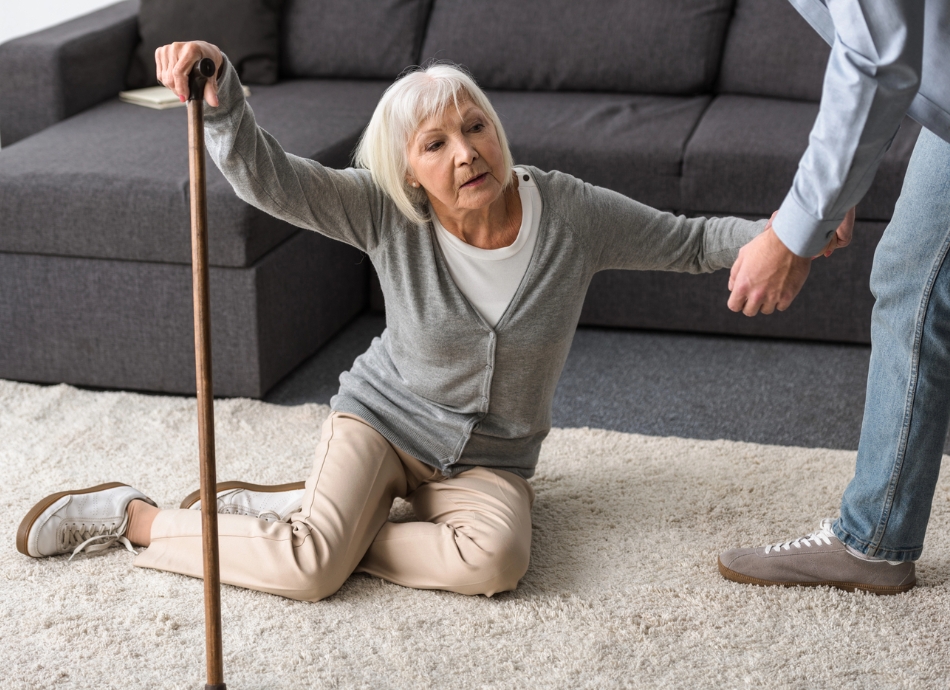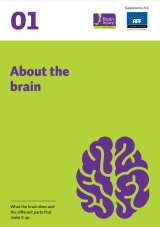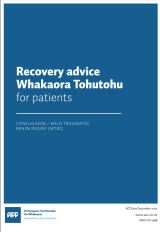You can now add Healthify as a preferred source on Google. Click here to see us when you search Google.
Head injury in adults | Wharanga ūpoko
This includes traumatic brain injury (TBI) and concussion (which is a mild TBI)
Key points about head injury (wharanga ūpoko)
- The term head injury (wharanga ūpoko) refers to injuries to the scalp, skull or brain that are caused by trauma, such as an external force or the impact resulting from an accident or fall.
- You should always get a head injury checked by a healthcare provider if it was caused by a hard bang, if it causes loss of consciousness or concussion, or if you’re concerned in any way.
- Concussion is a type of mild traumatic brain injury.
- Injuries to your head should always be treated seriously as there may be damage to your brain and symptoms may not appear immediately.
- Seek urgent medical help if the person with a head injury develops a severe headache, starts vomiting or shows signs of mood swings, unusual tiredness, concentration problems or changes in behaviour.

The term head injury includes:
- traumatic injuries to the scalp and skull, and
- internal injuries to the brain, known as traumatic brain injury or TBI.
The scalp is the skin covering your head and the skull refers to the bones of your head.
A TBI can be mild, moderate or severe, depending on how long you’re unconscious for (if at all), the degree of memory loss you have and a medical tool called the Glasgow Coma Scale. A mild TBI may or may not affect how your brain functions. A concussion is a mild TBI that does affect how your brain functions.
About 36,000 people in Aotearoa New Zealand experience a TBI each year, and 95% of these are mild in severity.
Find out more about brain injury and concussion.
You can also read about head injury and concussion in children.
If someone has had a knock to their head, they may have obvious signs of an injury to their head or face such as bleeding and bruising. Other signs of a head injury include:
- feeling dizzy or light-headed
- nausea (feeling sick) or vomiting (throwing up)
- not being able to remember what happened or recent events
- having a headache, which can be severe
- being confused
- leaking blood or watery fluid from their ears or nose
- being unconscious or semi-conscious
- blurred or double vision.
Anyone who knocks their head (playing sport or in a fight or accident) and gets up straight away, still needs to be closely watched. If they show any of the warning signs in the list below, they should see a healthcare provider immediately.
Likewise, anyone who is knocked out (is unconscious and can't be woken up, even if only for a minute or so) needs to see a healthcare provider urgently to exclude a skull fracture or serious brain injury.
Call Healthline free on 0800 611 116 if you feel at all uneasy about an injury or are unsure what to do.
Always get a head injury checked by a healthcare provider if it was caused by a hard bang, if it causes loss of consciousness or concussion, or if you’re concerned about any other physical or mental symptoms.
If someone is not alert or not responsive, unable to move all or some of their limbs or is complaining of neck pain:
-
- call 111 immediately
- don’t move the person (unless it’s dangerous to leave them where they are).
Get medical help urgently if you or someone you’re caring for:
- has received a hard bang on the head (eg, if they’ve had a major fall)
- appears dazed or loses consciousness, even for a moment
- is bleeding badly from anywhere on their head
- seems unwell or vomits after the injury or shows any of the warning signs below.
Warning signs – the following symptoms need immediate medical attention
- complaints of neck pain
- increasing confusion or irritability
- repeated vomiting
- seizure (fit) or convulsion
- blurred or double vision
- sleep difficulties – being very sleepy or difficult to wake
- slurred speech
- strange feelings or a loss of movement down one side of your body
- leaking blood or fluid from the ears or nose
- being lightheaded or dizzy
- fatigue or tiredness
- visible skull deformity
- muscle weakness, tingling or burning in arms or legs
- worsening level of consciousness or alertness
- severe or increasing headache
- unusual change in behaviour
- having difficulty remembering things.
Injuries to your head should always be treated seriously as there may be damage to your brain. If not treated properly, permanent and, often, preventable brain damage can occur.
Anyone who is knocked out – that is, they’re unconscious and can't be woken up, even if only for a minute or so – needs to see a healthcare provider urgently to check whether they have a skull fracture or serious brain injury.
If the head injury is minor with no worrying symptoms, see our self-care tips for caring for someone at home.
Delayed symptoms after a head injury
In some cases, signs of injury to the brain may not appear for 24-48 hours after a head injury due to a gradual increase in swelling or bruising around your brain.
Anyone who knocks their head (eg, playing sport or in a fight or accident) and gets up straight away, still needs to be closely watched. If they show any of the warning signs listed above, they should see a healthcare provider immediately.
Rarely, you can be well after a head injury but suddenly get worse some hours later due to bleeding inside your skull. Have someone with you for the first 24 hours so they can call for help if this happens.
Call Healthline free on 0800 611 116 if you feel at all uneasy about an injury or are unsure what to do.
Head injuries can happen in many different ways, including:
- being hit on the head
- sporting injuries
- car or bike accidents
- falls around the home (especially for toddlers and older people)
- falls from heights
- speed-related blows to the head.
Older people
The most common cause of traumatic brain injury in older people is a fall. If you or someone you care for has experienced a fall, see a healthcare provider as soon as possible to check for the possibility of a brain injury. A brain injury can occur even if the fall is minor or not from a great height.
Find out more about falls and how to prevent them.
Depending on which medical service you’re first seen by (GP clinic, urgent care clinic or emergency department), a doctor, ambulance paramedic or hospital staff will assess how serious your head injury is.
You’ll be asked about what caused your injury and how it happened, and what symptoms you experienced. If you aren’t seen straight after your injury, your healthcare provider will also ask about any ongoing symptoms – these could be physical, cognitive (to do with your thinking), behavioural or emotional – and how they’re affecting your day-to-day life. Any video footage of the event itself will be useful to assist with a diagnosis.
Your healthcare provider will look for signs of injury such as skull fractures and injury to other parts of your body, and they’ll do tests to check your nervous system. These tests will look at things such as your reflexes, coordination, how well you can feel different sensations, and your memory and thinking skills. They'll also assess your level of consciousness using the Glasgow Coma Scale which is based on whether you can open your eyes by yourself, how well you can answer certain questions and how well you can move your body. See the Glasgow Coma Scale(external link).
Traumatic brain injuries can be mild, moderate or severe depending on how long you’re unconscious for (if at all), your level of consciousness (alertness) after the injury (based on your GCS score), and how long it takes to remember things after your injury.
Concussion is a type of mild traumatic brain injury. Your healthcare provider may use a concussion screening tool, which is like a questionnaire, to assess you. This can also be used to monitor your improvement over time.
If you’re with someone who has a head injury:
- Get medical help straight away if they’re unconscious or have any of the signs listed above.
- Sit the person down if they’re conscious, but don’t move them if you suspect a neck or back injury. Apply a cold cloth or ice wrapped in a cloth to the site of their injury.
- If they have a bleeding wound, apply direct firm pressure to the wound to stem the bleeding. Don’t apply pressure if you think they might have a skull fracture.
- Check the person's airway and breathing. If they become unconscious, but are breathing, there are ways to help them(external link).
It’s best to get checked by a healthcare provider after any head injury. This is especially important if you have a severe headache, had any loss of consciousness or have a concussion.
How a head injury is managed will depend on how severe it is. This will be determined by your Glasgow Coma Scale score and whether you have risk factors such as a possible skull fracture, prolonged loss of consciousness or memory loss. You may need to go to the hospital emergency department for further assessment or your healthcare provider may be able to monitor you at the clinic.
Once you’re able to go home there are things you should do to help your recovery. Read more in the self-care section below.
Your healthcare provider will also complete ACC forms so that you’re able to get time off work (or reduced duties), compensation payments, and access to concussion treatment if needed.
The following is advice you should follow if you or a family member has a minor head injury with no worrying symptoms, or if you’ve had a concussion and been allowed to go home after being checked by a healthcare provider. If you have any concerns at all, see your healthcare provider.
-
Rest your mind and body in a quiet place for 24 to 48 hours after your injury – don’t do any strenuous activity and avoid reading, listening to music and screen time such as using a computer or watching TV.
-
Have a responsible person stay with you for at least 48 hours after your injury in case you develop new or worsening symptoms and need to be seen by a healthcare provider.
-
Use an ice/cool pack on your head injury if needed. Apply ice or a cool pack to your injury for 10 to 20 minutes, every 2 to 4 hours, for 1 to 2 days after your injury. Ice wrapped in a tea towel or a pack of frozen vegetables will work well. This will reduce swelling of the scalp and help with the pain.
-
Stay hydrated. Drink clear fluids to reduce the chance of vomiting. Clear fluids include plain water, fruit juices without pulp, clear sodas such as ginger ale or lemonade, and tea or coffee without cream or milk.
-
Avoid alcohol, sleeping tablets and recreational drugs until your symptoms are better.
-
Use paracetamol for any headache in the first 48 hours. You can add an NSAID, eg, ibuprofen, naproxen or diclofenac,(external link) after this if you need to.
-
Don’t drive for at least 24 hours. If you drive a commercial vehicle, don’t drive for 48 hours and you’ll need to be reassessed before you start driving again. Read more about head injuries and driving(external link).
-
Slowly return to your normal activities as your symptoms allow. See our concussion(external link) page for information about returning to normal activities after a concussion. You can also read ACC’s Recovery advice for patients with concussion/mild traumatic brain injury(external link).
-
See your healthcare provider for a follow-up appointment after 7 to 10 days. You can see them earlier, or call an ambulance or go to hospital, if your condition gets any worse or if you have any of the warning signs listed above.
Apps reviewed by Healthify
You may find it useful to look at some first aid and emergency apps and pain management, headache and concussion apps.
There are things you can do to reduce the risk of a head injury or concussion including the following:
- Use safety equipment, such as seat belts, bicycle or motorcycle helmets, and hard hats, during activities that could cause a head injury.
- Always use child safety seats in a car.
- Follow bicycle safety recommendations(external link).
- Don’t drive (or be driven) under the influence of alcohol or drugs.
- Check your risk of a fall(external link) and find out what you can do to reduce the chances of a fall(external link).
- Install window guards and stair gates to prevent children from falling at home.
- Find out about preventing family violence(external link).
- Follow the rules of your sport and limit the number of contact practices for contact and collision sports.
- Neck strengthening exercises and use of a mouthguard in contact sports may be helpful.
After a head injury, many patients will have minor symptoms that will get better within days, while some will have symptoms that last for weeks. A few people will have symptoms that go on for longer and may require ongoing rehabilitation.
The more serious your injury, and the greater the length of time with amnesia (memory loss) after your injury, the more likely it is that you’ll have ongoing symptoms.
You can help speed up your recovery after a mild traumatic brain injury by following the advice in the self-care section above. Read more about the outlook after a concussion.
Apps reviewed by Healthify
You may find it useful to look at some first aid and emergency apps and pain, headache and concussion apps.
Reducing traumatic brain injuries (TBI)(external link) ACC NZ
Head injuries and concussion(external link) Health New Zealand | Te Whatu Ora
First aid for head injuries(external link) St John, NZ
Head injury – first aid(external link) Medline Plus, US, 2019
Live stronger for longer – prevent falls and fractures(external link) An Aotearoa New Zealand website created by ACC and other partners that’s dedicated to helping older adults prevent falls and stay healthy.
Brochures
About the brain – Mild Traumatic Brain Injury(external link) Brain Injury New Zealand and ACC, NZ
Recovery advice Whakaora Tohutohu for patients – concussion/mild traumatic brain injury (MTBI)(external link) ACC, NZ, 2022
Video: Changed in a moment with O'Connor
O'Connor sustained a traumatic brain injury in a motorbike accident. His mother thought he'd never gain independence, but 13 years on he's flatting and working.
(Attitude Live and ACC, NZ, 2019)
Apps
First aid and emergency apps
Pain management, headache and concussion apps
Falls prevention apps
References
- Head injuries and concussion(external link) Health New Zealand | Te Whatu Ora, NZ, 2024
- Head injuries in adults(external link) Auckland HealthPathways, NZ, 2024
- Sport Concussion in New Zealand – National guidelines(external link) ACC, NZ, 2024
An overview of concussion/mild traumatic brain injury management for primary healthcare professionals(external link) BPAC, NZ, 2024
Clinical guidelines
Head injury pathways(external link) NICE, UK
Head injury clinical guidelines(external link) Starship Hospital, NZ
Serious illness conversation guide(external link) Tō tātou Reo | Advance Care Planning, NZ
Continuing professional development
Trauma Assessment & Care of the Trauma Patient Webinar – Toni Johnston (Duration: 1 hour 13 minutes)
(Mobile Health, NZ, 2020)
Brochures
Credits: Healthify editorial team. Healthify is brought to you by Health Navigator Charitable Trust.
Reviewed by: Dr Stephen Kara, Sport and Exercise Physician, Queenstown
Last reviewed:







